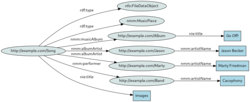GNOME Tracker 3.0 and GSoC Work
-
Tracker 3.x, a retrospect. - Carlos Garnacho
Time files, for better or for the worst. The last time I bored you with ramblings on this blog was more than 2 years ago already, prepping up for Tracker 3.0. Since I’m sure you don’t need a general catch up about these last 2 years, let’s stay on that same subject.
Nowadays, we are very close to GNOME 43, and an accompanying 3.4.0 release of Tracker SPARQL library and data miners, that is 4 minor releases ahead! What happened since then? Most immediately after that previous blog post, the 3.0 release did roll in, the uncertainty behind all major structural changes vanished, and the transition could largely be called a success: The overhauled internals for complete SPARQL support stood ground without large regressions; the promises of portals and data isolation delivered and to this day remains unchallenged (except for spare requests to let more pieces of metadata through); the increased genericity and versatility kept fostering further improvements.
Overall, there’s been no major regrets, and we are now sitting comfortably in 3.x. And that was all good, since we could use all that time not fixing fallout in keeping up with the improvements. Let’s revisit what happened since.
-
Wrapping up GSoC’22!. My 12+ weeks in the Google Summer of… | by Pooja Patel | Sep, 2022 | Medium
My 12+ weeks in the Google Summer of Code program have finally come to an end. It’s incredible how quickly time passes and how things develop. It has been a great journey and I have learned a great deal about software web development and design from exploring the project.
GSoC is a global, online program focused on encouraging budding developers and designers into the world of open-source. GSoC introduced me to the amazing GNOME community. Looking back, a year ago, I was hesitant and apprehensive about even applying to GSoC. But this program has helped me grow and push through the boundaries of my technical and soft skills.
-
Aryan Kaushik: Pitivi GSoC: Final Report
This project was aimed at porting Pitivi to GTK4, Pitivi used the GTK3+ library and required the change.

